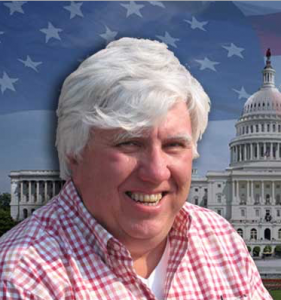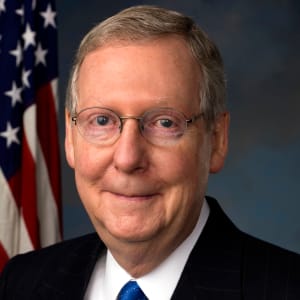Plummeting cargo shipments, empty ports, declining trucking volumes, major retailers warning about empty shelves. All that and much more is the result of the inexplicable trade war President-cum-Dictator Donald Trump has launched over tariffs, embroiling not only the United States but the world in an economic funk.
And it’s all hunky-dory with Rep. Andy Barr, R-Lexington, who wants the Trump imprimatur on his nascent campaign for the U.S. Senate so, so, so much that he’s willing, like a lemming, to follow the increasingly deluded leader off the cliff.
Trump’s simpleton maneuvering will prove to be “jet fuel for our economy,’’ Barr told WHAS-TV in Louisville on Friday, without bothering to note that jet fuel is highly flammable.
“In the short term, there’s obviously turbulence with this,” Barr said. “We need the turbulence because in the long run, we’re going to have access to markets and we’re going to have less disruption and we’re going to have more free trade. Thank goodness he’s doing it because it gives us the chance to level the playing field.”

Expanding further, Barr posted on X, “President Trump is fighting for our national interests on trade. We won’t offer countries a free ride to enter the American market when they are charging our businesses surcharges to enter theirs.’’
Now, there’s no use at this stage delving once again into Andy’s starry-eyed affection for Donald J. Trump and his blind faith in a man of dubious character and often evil intent. His devotion is just plain silly, yet he will do anything to gain Big Daddy’s approval.
What needs to be discussed is Barr’s destructive support of a trade war that could ultimately send the economy reeling. Nancy Qian, a professor of economics at the Kellog School of Management at Northwestern University, told KellogInsight that, “Tariffs this broad and at this scale haven’t really happened in modern times.’’ The Wall Street Journal, not exactly a bastion of left-wing thinking, simply called the schlamassel “the dumbest trade war in history.’’
In what he touted as Liberation Day on April 2, Trump announced plans to impose tariffs of 10 to 60 percent on dozens of America’s trading partners, with the exception of China, the nation’s third-largest, who ultimately drew a 145 percent levy, a move that essentially brought market transactions between the two counties to a screeching halt.
The incomprehensible moves resulted in worldwide economic upheaval, leading to panic in the bond market and a sliding U.S. dollar value. Reality led Trump to temporarily suspend most of the planned tariffs to provide an opportunity to, in the administration’s mind, strike 90 trade deals in 90 days.
The White House is falling short of that goal. But on Thursday, Trump announced a trade framework with Britain, one of the dozens of nations and principalities that were hijacked into the global trade war. While the devil remains in the details, it appears the U.S. will agree to cut tariffs on certain British goods while Britain agrees to purchase more items, like American beef.
Still, the question on everyone’s mind is, why? Trump has vacillated on his skewed reasoning for, as an example, imposing 25 percent tariffs on goods imported from Canada and Mexico, two loyal allies and the nation’s top trading partners. Prior to the latest levies the two countries had essentially tariff-free trading agreements with the U.S. for three decades under the North American Free Trade Agreement.
At first, Trump tried to sell it as a fight against fentanyl imports, which is ridiculous on its face since a) fentanyl is an illegal substance that obviously isn’t subject to tariffs, and b) there is barely any fentanyl illegally crossing the border from Canada. Now it seems Trump, for whatever reason, just adores tariffs – he once called tariff “the most beautiful word in the world” – and sees it as a way to raise money, offsetting, perhaps, the $4.5 trillion price tag in his proposed tax cut legislation.
Now Trump, meeting with his cabinet on April 30, is insisting a trade war is necessary to “save the country,’’ although what he hoped to save it from went unstated. Drastic steps were necessary, he indicated in a Meet the Press interview with Kristin Welker, because “we inherited a mess’’ from his predecessor, former President Joe Biden, although most economists credit Biden for guiding the nation’s economy to a soft landing after the COVID-19 crisis and recent polls show that a majority of those questioned blame him.
Trump said he doesn’t fear a recession after the implementation of his policies, despite a decline in economic growth over the first quarter. A second such quarter and we’ll call it a recession.
“Anything can happen. But I think we’re going to have the greatest economy in the history of our country,’’ he told Welker. “I think we’re going have the greatest economic boom in history.’’
You betcha.
Regardless, the episode, which is far from over, has created turmoil. The standoff with China has proved particularly troublesome, with the giant Asia nation announcing retaliatory tariffs, bringing the levy on most American goods to 125 percent. According to Oxford Economics, The US imports $433.74 billion worth of goods from China, representing about 11 percent of all U.S. trade with electronics, toys, furniture and machinery topping the product list.
Now, as a result of the dispute, the People’s Bank of China has taken steps to stabilize that nation’s economy and bolster financial markets. If Trump thinks the Communist nation of 1.4 billion is going to be a pushover in this contest, he may want to reconsider. Besides, with the U.S. raising tariffs on everybody and his brother, China is liable to find other lucrative markets elsewhere.
At any rate, if the Chinese market shuts down and the flow of inexpensive goods dries up, American consumers are sure to pay higher prices and face the impact of renewed inflation, two issues Trump vowed to correct upon assuming office.
As a result of the levies instituted by the Trump regime, retailers who sell imported goods, and the customers who purchase them, will feel the pinch. Dock workers and truck drivers will see their jobs almost immediately imperiled.
Farmers, according to Peter Friedmann, executive director of the Agriculture Transportation Coalition, are “already in a full-blown crisis.’’ The U.S. Department of Agriculture is reporting that China last week cancelled its largest order of pork since the COVID crisis, revoking a 12,000-ton shipment. It also halted an order for 1,800 tons of soybeans.
Consumer confidence is suffering. Higher prices will likely lead to lower demand, potentially leading to lay-offs in various employment sectors. According to Politico, “Concrete signs of reduced consumer spending are already appearing: McDonald’s said last week that sales in its nationwide restaurant chain fell unexpectedly in the first quarter of 2025 because customers were “grappling with uncertainty,” while Harley-Davidson reported a double-digit decline in sales because of consumer uncertainty. The motorcycle manufacturer said it was pulling its guidance for future quarters’ revenue and profit because it cannot predict where the economy or consumer sentiment will be just a couple of months hence.”
And that’s just the beginning. Things will get worse as the year drags on unless Trump reconsiders.
Kentucky, of course, will suffer like everywhere else. Rep. Morgan McGarvey, D-Louisville, told ABC News that the Commonwealth’s $9 billion bourbon industry is facing millions of dollars in losses. Provinces in Canada are already pulling it off the shelves.
“We’re going to lose tens of millions of dollars in bourbon sales in Ontario province alone, not to mention the whole country, because of what Trump’s policies are doing,” he said.
Another industry strongly identified with the state, horse racing, also stands to suffer. Churchill Downs announced it is suspending plans for a $900 million renovation because of uncertainty over economic conditions. Questions remain about the importing and exporting of thoroughbreds. According to the Lexington Herald-Leader, Churchill officials were concerned that certain ticket sales for the Kentucky Derby may have gone down this year because of the trade war. Kentucky farmers will suffer just like other farmers across the country.
This is what our boy Andy has bought into. He’s going to be a great senator, isn’t he ladies and gentlemen?

















